Incarcerated 37 years for burglary convictions, Larry Garrett has been given a second chance at life thanks to Appleseed’s legal team.
By Leah Nelson, Appleseed Research Director
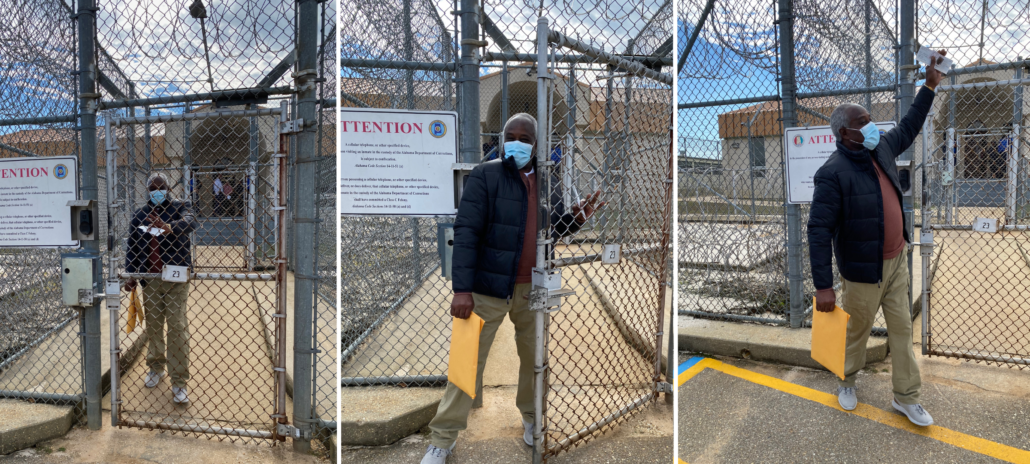
Larry Garrett leaves Holman Correctional Facility after spending 37 years incarcerated. Photo credit Leah Nelson.
The second-to-last time Larry Garrett left prison was about seven years ago, in a helicopter that flew him to a hospital in Mobile where he was treated for life-threatening stab wounds. Doctors there patched him up and sent him back to prison. He expected to die there: Death in prison is what a sentence of life without parole means.
The last time he left prison was on Dec. 19, 2022. After shaking hands with the warden, he walked out the front gate, a free man at age 68, with the rest of his life ahead of him.
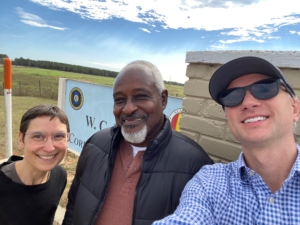
Mr. Garrett with Appleseed Research Director Leah Nelson and Staff Attorney Scott Fuqua outside of Holman Correctional Facility. Photo credit Scott Fuqua.
I was there with my colleague Scott Fuqua, the lawyer whose petition and persistence led to Mr. Garrett’s reversal of fortune. Scott left Birmingham at 5:00 that morning and picked me up in Montgomery on his way south to Atmore, which is home to three prisons, a casino owned by the Poarch Creek Band of Indians who were Alabama’s original inhabitants, a gas station that sells an assortment of Confederate, gun, and Jesus-themed hats, and not much else. We’d been told Mr. Garrett would be released at 8:30 AM and wanted to arrive in plenty of time to make sure he had fresh civilian clothing to wear when he walked out the door.
To make your presence known at Holman, you get out of your car, cross the parking lot on foot, and holler at a guard in a tall brick tower until you get his attention. I hollered while Scott handed Mr. Garrett’s new clothing to the warden as he walked in.
It would be three hours before Mr. Garrett was finally released. Scott and I passed the time by watching an orange cat and her kittens make their way back and forth through the coil of barbed wire that forms part of the multilayered fence separating Holman from the free world.
The cats, three of what Mr. Garrett estimates to be at least 40 who live on the premises, represent the only part of Holman’s population that is growing. When I first started working with incarcerated people in Alabama in 2012, Holman was one of the most populous and violent prisons in the state, a maximum-security facility that housed most of Alabama’s 200-plus death row inmates as well as nearly 1,000 more incarcerated individuals.
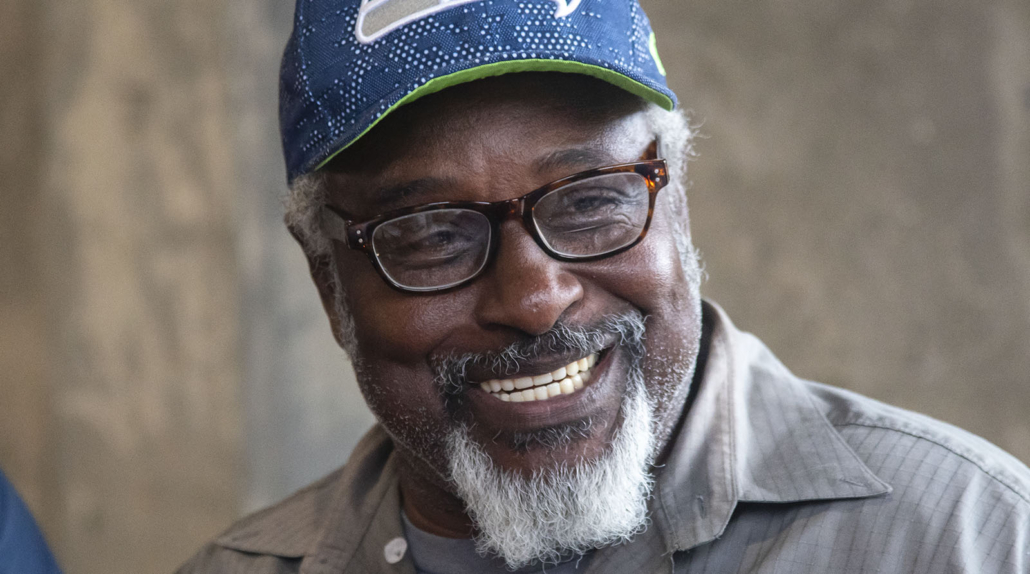
Larry Garrett over a month after his release. Photo credit Bernard Troncale.
Mr. Garrett spent 37 years there and at other Alabama prisons. For nearly four decades, he rose at 2:30 each morning to work in kitchens, where he baked the bread that formed a major part of his fellow prisoners’ diets.
He lost that job in January 2020 when Holman was decommissioned and mostly shut down because its physical infrastructure had collapsed under the stress of continuous overcrowding and neglect by the state. Today, only death row and a small dorm survive what was once known as one of America’s most dangerous prisons. Food preparation happens offsite at one of the two other prisons in Atmore.
A chaplain, his daughter, and the power of forgiveness
His vocation as a baker was the first thing I learned about Mr. Garrett. The person who told me, Tracey Browder, did so as we walked behind my then-seven-year-old daughter Naomi, who was learning to ride on a horse named Star at the Browder family’s property on the west side of Montgomery.
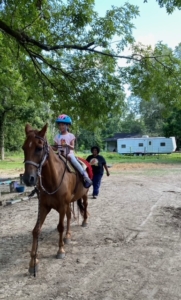
Naomi and Tracey Browder at the Browder family’s farm. Photo credit Leah Nelson.
Star, like most of the other horses on the property, is a rescue horse. The Browders take them in from owners unable or unwilling to care for them well. The property sits in an unpromising corner of the city: To get there, you pass several abandoned motels and a truck stop before turning right between a welding shop and a place where people leave cars to be sold for scrap. Drive about an eighth of a mile and you will come upon an oasis. The horses, who are cared for by a few of the formerly incarcerated men who now live on the property along with some of the Browder family, will come up to the fence to greet you. More than likely, Tracey will also be there, along with some local teenagers who train and help keep the horses in shape by riding them fast across the alley and around the pond in the woods.
In 2020, when Naomi was six years old and the pandemic was the only thing anyone could think about, she espoused a wish to ride. Growing up in Connecticut, I thought of riding as an exclusive hobby for rich people. But in Alabama, it’s much more accessible and affordable. It was hard to say no to a child from whom normalcy had been snatched mid-kindergarten and who simply wanted to do a nice outdoor activity. I’m friends with Tracey’s sister, and when I saw her ads for “More Than A Horse Farm” on Facebook, I decided to let Naomi give it a whirl.
And so it happened that over the course of many dusty and hot and muddy and cold and perfect and beautiful weekend mornings, I learned from Tracey the story of Larry Garrett, who she called the Bread Man of Holman.
Tracey knew Mr. Garrett the same way she knows scores of men incarcerated in Alabama. Together with her father Curtis “Chap” Browder, she and the Browder family run a ministry that is in and out of nearly every men’s prison in Alabama, bringing red velvet cake, barbeque and other homemade food along with unconditional affection for the incarcerated men.
The ministry, which at 45 is older than I am, has its roots in Chap’s 1978 appointment by then-Governor George Wallace as the first Black prison chaplain in Alabama. One of Chap’s first tasks on taking that job was to minister to Robert Chambliss, one of several Klansmen responsible for the 1964 terrorist attack on Birmingham’s Sixteenth Street Baptist Church that killed four little girls.
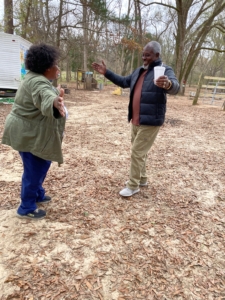
Tracey Browder and Mr. Garrett embrace after his release. Photo credit Leah Nelson.
Chap grew up in Birmingham, attending the same schools and living in the same neighborhood as the families of those girls. He left Alabama not long after their murder. As he tells it, he departed full of hatred for white people. He told himself that if he ever met the men who set those bombs, he would kill them.
When the time came, though, he instead found himself praying with one of them. In that moment, he says, he made a decision to forgive instead of holding on to the past. He describes that decision, and the shared prayer that followed, as one of the most powerful experiences in his life.
Today, Chap and his family occupy an unusual place in Alabama’s prisons, which are so violent and deadly that the U.S. Justice Department under then-U.S. Attorney William Barr sued them for violating prisoners’ rights to live free from cruel and unusual punishment. In 2022, 266 people died in our prisons. Many of those were preventable deaths: homicide, suicide, overdose. Stabbings like the one that led to Mr. Garrett’s 2015 evacuation to a Mobile hospital are routine. Sexual assault, extortion, and torture are the norm.
When justice also means freedom
I’m not a lawyer, and I try not to pressure Appleseed’s legal team with my vision or hopes for specific incarcerated people. Their job is difficult and highly specialized: As a small office, we can only take a few cases at a time, and no one needs to hear from me that I want someone in particular on their docket. It’s too much pressure and there are so many deserving candidates sentenced to die in prison under Alabama’s excessively harsh Habitual Felony Offender Act.
But Bread Man was compelling – and, crucially, he met the requirements Appleseed has for Second Chance clients: The sentence he received in 1985 would be illegal under current Alabama law, and no crime he has ever committed, including the conviction that triggered his Life Without Parole sentence, has resulted in physical harm. More than anything else, those factors are what made it possible for our small legal team to take his case and win his freedom.
They investigated and discovered that if Mr. Garrett were sentenced today, the longest term he could receive would be 20 years in prison. They also learned that he entered a plea to the 1985 burglary that prompted his sentence, meaning he gave up his right to a trial only to be sentenced to the harshest possible sentence available.
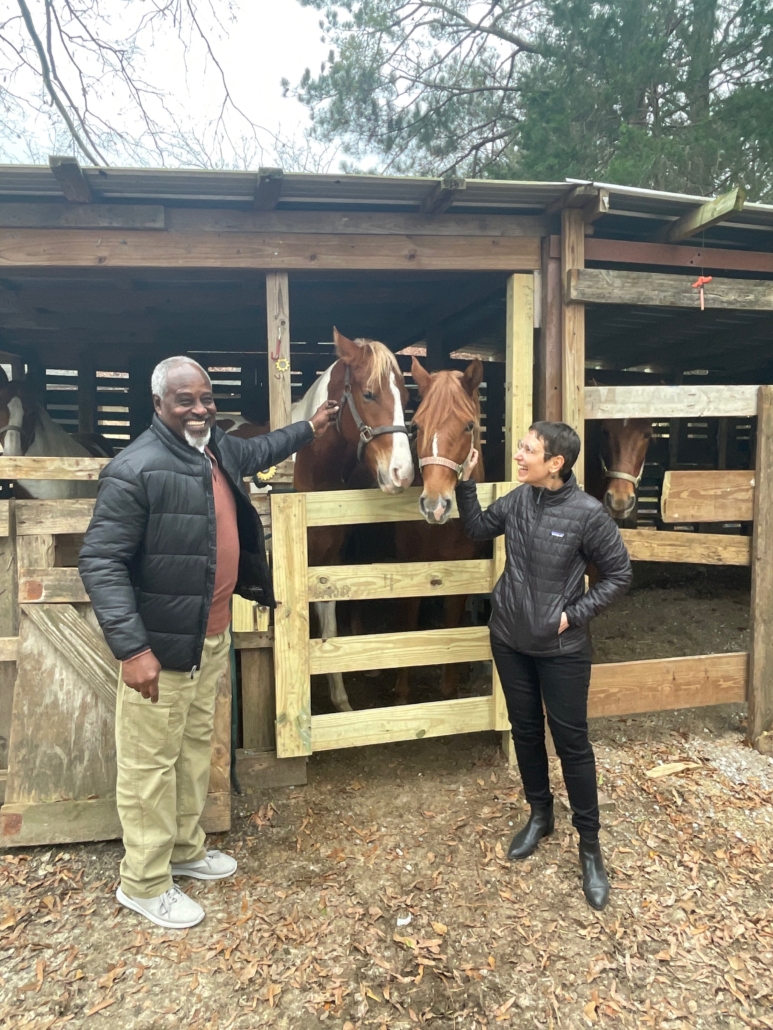
Mr. Garrett with Leah Nelson on the Browder family’s farm. Photo credit Scott Fuqua.
And they found that, in the opinions of the people closest to him, Mr. Garrett was ready for freedom. The corrections officer who supervised his work in the kitchen starting in 2002 called him an outstanding worker and leader. Of his ability to overcome in a prison where conditions are so malignant that in 2016 some of the incarcerated men rioted, she wrote that he “work[s] great with inmates” and his relationships with staff are “great, great, great.”
The prison chaplain called him an “integral part” of Holman’s honor program whose “long hours and dedication … have brought the program to where it is today.” And his younger brother Marshall, who sent Mr. Garrett money and spoke with him several times a week during his 37 years in the system, said he was prepared to offer him a home and a job at his Talladega auto repair shop.
“The primary responsibility of a prosecutor is to seek justice,” the District Attorney wrote in his Nov. 29 response to Mr. Garrett’s petition to be resentenced to time served. “[T]he state believes that the interests of justice in this case would be best served by permitting resentencing or entering an amendment of sentence.”
On Dec. 15, a judge entered an order resentencing Mr. Garrett to time served. Four days later, Scott and I rose before dawn to bring him to the re-entry facility where he’ll spend a few months reacclimating to life outside before moving in with his brother. On the way home, we stopped at Chap’s farm, where Mr. Garrett was reunited with Tracey and spent some time with Star and the other rescue horses.
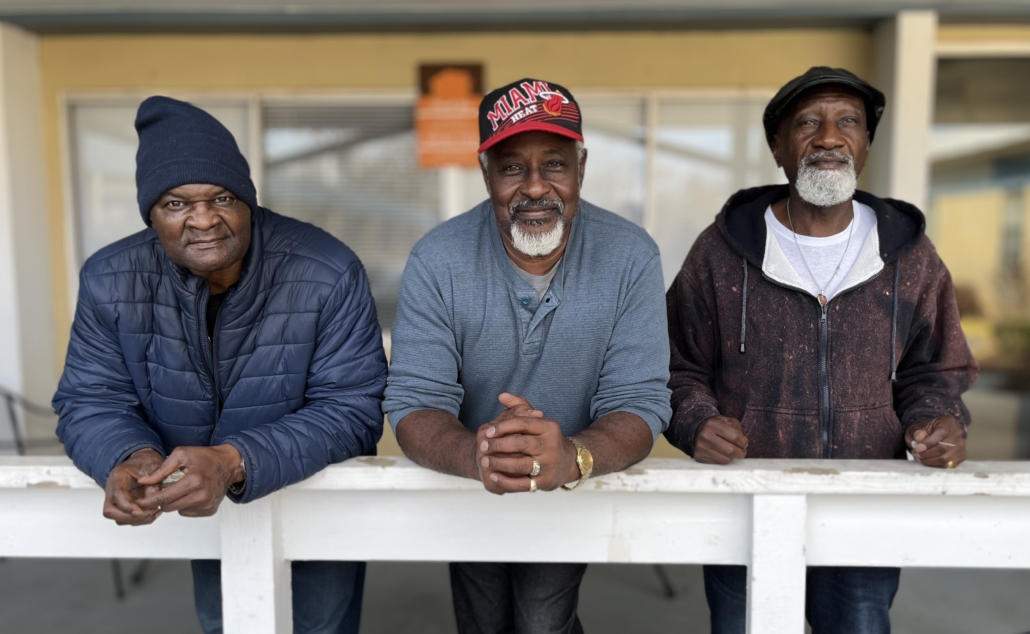
Three of Appleseed’s recently released clients Willie Ingram, Larry Garrett, and Lee Davis. Together, they served a combined 115 years in Alabama prisons. All are living safely at Shepherd’s Fold reentry ministry and flourishing in Appleseed’ re-entry program, which provides extensive wrap-around services, including assistance with obtaining identification, transportation, meals, and connections to medical care and social security. Photo credit Bernard Troncale.
A couple years ago when I told Naomi the animals at Chap’s were rescue horses, she was stunned. “Horses that rescue people?” she asked me. “How?” I explained that it was the other way around; the horses were not the rescue-ers but the rescue-ees, taken out of dangerous situations by people who cared about their wellbeing and brought to a place where they could be happy and free.
In the end, we were both right.

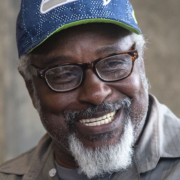




Leave a Reply
Want to join the discussion?Feel free to contribute!